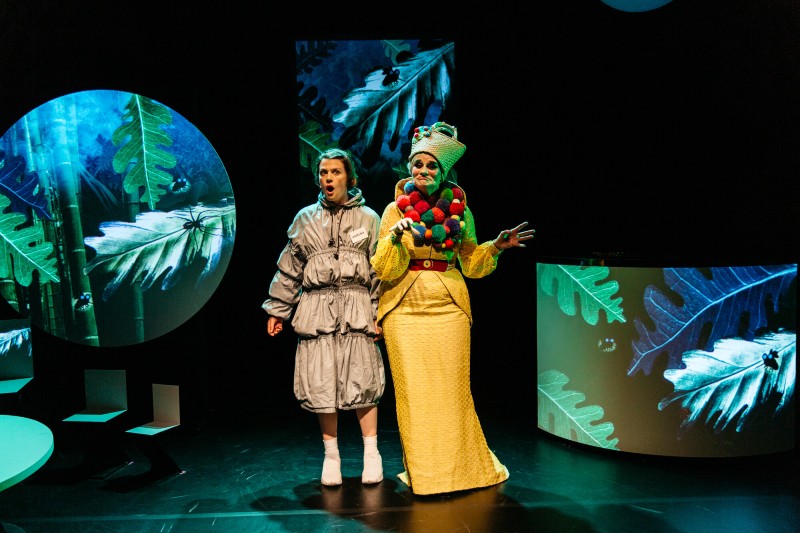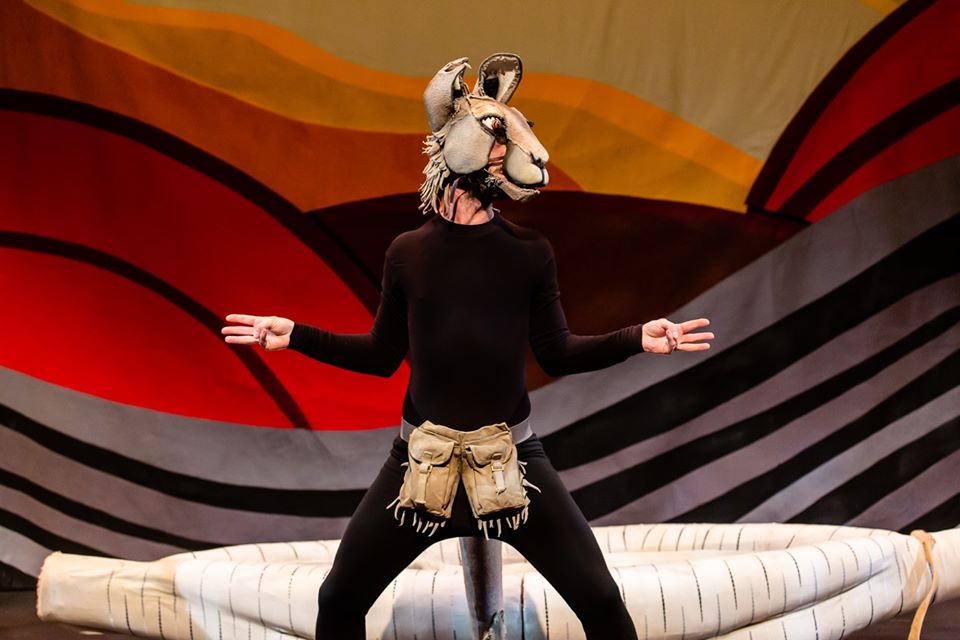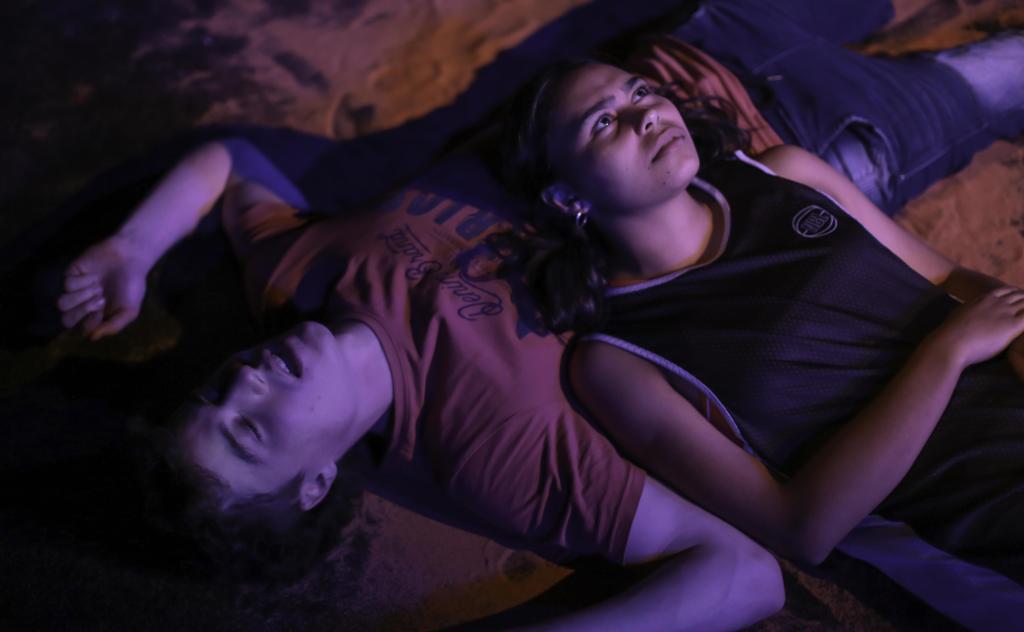‘And when the storm is over, you won’t remember how you made it through, how you managed to survive. You won’t even be sure, whether the storm is really over. But one thing is certain. When you come out of the storm, you won’t be the same person who walked in. That’s what this storm’s all about.’ – Haruki Murakami
In 1990, I was fortunate enough to experience a production of Stormen (The Tempest) by Unga Klara Lagret at the Stockholm Stadsteater as part of the ASSITEJ (International Association of Theatre for children & young people) World Congress & Theatre Festival. It was a sublime re-imagining of Shakepeare’s classic tale by a fully funded state theatre company for children, given the time and support to realise an incredible production – complete with a ship’s deck that could catapult the characters onboard into the sea.
As I listened to friends and colleagues describe the current challenges they are facing in the theatre for young audiences (TYA) & youth arts sector, I could not help feel we are all like the characters in that extraordinary work, and have, in essence, been catapulted into heavy seas. Federal funding for TYA companies continues to decline significantly, with a range of high-profile organisations cut in the latest funding round.
While it is important to acknowledge that Australia is lucky to have funding at all for the arts, it is apparent this funding structure appears finally and fundamentally broken. Add the challenges of COVID to this and times indeed look dire.
In the youth arts sector, the COVID-19 impact statement co-authored by Australian Theatre for Young People, Marian Street Theatre for Young People, Corrugated Iron Youth Arts and Jopuka Productions, revealed the following:
- 0% of programmed activities are running as normal
- 52% of companies have stood down core staff
- 69% of companies have stood down casual staff and contracted artists
- 48% of national workshop programs have been cut or postponed
- 52% of companies feel it is still too early to understand the long term implications of the shutdown
And this was just one small part of the survey, which covered the impacts for young people, staff, and industry.
Read: Slamming shut a window of possibility: youth theatre in crisis
Some in the Australian TYA sector have described this as the end of the world as we know it. But in The Tempest, while the characters are at first disoriented, they do eventually find their way back to land; And perhaps – just perhaps – there is some rough magic at play.
In these challenging times, artists and organisations are responding in ways that both inspire and surprise.
Windmill Theatre, the flagship company based in Adelaide, sets an incredibly high benchmark for digital engagement for TYA in Australia.
I asked Artistic Director Rosemary Myers if Windmill were the best prepared for the onset of the COVID-19 crisis given their suite of works on screen prior to the crisis.
‘Not really,’ she said. ‘It’s complex. We had 300 shows cancelled and were six weeks into a three-month US tour. We really miss the shows. And our audiences do too. To the point that given the choice to refund or reschedule their tickets, not knowing even when that reschedule performance might take place, the overwhelming majority chose to reschedule.’
That said, Windmill offers a compelling range of digital offerings. Myers describes the company’s approach: ‘We asked, “How does Windmill tell stories in the digital space?” The answer is Windmill at Home. A suite of digital experiences, content and activities that bring some of our favourite characters, stories and faces into your home. We’ve worked with artists to revisit some of our best friends, including Grug and Beep, to reinvigorate some of our digital experiences and interactive journeys and have created exciting ways to get people young and old up, moving, building, and creating.’

Elizabeth Hay and Christine Johnston in Windmill’s Baba Yaga. Photo credit: Sia Duff.
Creators of wonder, Slingsby – also based in Adelaide – have responded quickly to the rapidly shifting landscape, creating Slingsby By Request with their production Emil and The Detectives for Years 4-12. They offer three online packages for students titled Front of House, Backstage Pass and Access All Areas, accompanied by the significant education resources that complement all their work.
‘At Slingsby, right now we are determined to keep the joy and wonder of live performance alive for students,’ said Artistic Director Andy Packer. ‘Nothing can compare to the “shared time and space” of live theatre, but in extraordinary times we must learn to adapt. Slingsby by Request has been created for our audiences and importantly is generating income for the award-winning artists at the heart of our productions.’
Independent and regional artists are challenged in different ways to well-resourced companies with ongoing support. They rarely attain secure funding on any statistical measure, and often do not possess the resources that would enable them to wait it out while remaining resilient and creative. There is evidence, however, that presenting organisations are really listening to these challenges.
The collective of regional artists known as Threshold have embraced the challenge of the COVID crisis to deliver Mountain Goat Mountain: an audio-led theatre experience designed for families to experience in their own home created by Zoë Barry, Liz Francis, Nikita Hederics, Tahli Corin and Sarah Lockwood.
As Lockwood explains: ‘We’ve had people telling us for some time that we should create digital experiences, but as theatre makers we weren’t confident that what we loved about theatre would translate. It quite literally took a pandemic for us to put that scepticism aside, and use the medium, rather than shy away from it.’

‘The floor is lava!’ Threshold’s Mountain Goat Mountain. Image supplied.
Threshold have been supported in creating the work by Arts Centre Melbourne, DreamBig Festival in Adelaide, AWESOME international children’s festival in Perth and Home of the Arts on the Gold Coast.
‘They came on quickly, and really trusted that we would be able to turn something around in a very quick timeframe. Without that trust and support, Mountain Goat Mountain wouldn’t have been possible,’ said Lockwood.
‘This was our first fully digital work for families and the challenge was to build a framework that would empower families to build their own theatrical world. As theatre makers we’re accustomed to shaping every element of the production – but in this instance we’re collaborating with families in a different way,’ Lockwood said… ‘we have to trust we can create moments of magic and wonder that we will never see.’
Independent artist Alex Desebrock describes herself as ‘the lady behind’ Western Australian-based organisation Maybe ( ) Together.
During this time her energy has gone into advocacy more than creative work, partnering with ArtPlay, ARTelier, Sydney Opera House and Art Gallery WA to roll out SHIFTING & STIRRING: Participatory Creative encounters for children. Desebrock has also been incredibly proactive in connecting and supporting artists via the Facebook group Australian Arts amidst COVID-19.
‘I’m still in fight/flight mode and that is not a space of creativity for me, but the advocacy has had some really extraordinary results. I feel more connected to the east coast of Australia, its artists and organisations, than ever before. The generosity of the industry to share information has been amazing. Nationally we have come together in an awesome way,’ Desebrock said.
One major surprise for Desebrock was the rapid growth of the Australian Arts amidst COVID-19 group – initiated when she discovered that much of what did exist for children online was from the USA. Consequently, she reached out to see what artists here were doing.
‘Before we create, we need to come together, and this [Facebook group] gives us the ability for us all to gather online nationally – it’s not a conference, … and artists are present, unlike most national conferences … A seed has been firmly planted and I think we will see some growth,’ she said.
REFLECTING, CONSIDERING, CREATING
Like Desebrock, we are all responding differently to the COVID crisis. Some of us are making; others are using this time to reflect and consider – and the subsequent discoveries and transformation are not always related to direct creative output.
Polyglot – a company steeped in participatory works of scale – has discovered new ways to collaborate with their artists and other organisations during this time, while Arena Theatre have focussed directly on keeping their community connected.
Terrapin in Tasmania have been focussed on supporting their artists while their delightful digital works are being picked up in South Africa and Austria.
Sam Routledge, Terrapin’s Artistic Director says: ‘We are using social media and our on-demand screening but not over-communicating and not rushing into digital delivery.
‘Currently we are collaborating with artists on physical distancing studies of domestic tasks which have been picked up in Johannesburg and curated as part of the Unprecedented Times exhibition at Kunsthaus Bregenz, a contemporary art museum on the Austrian border, and working with First Nations artist/writer Nathan Maynard [on the on-line streaming of his play A Not So Traditional Story] … Importantly we are supporting our artists to do their own projects … It’s okay short term to really focus on the artists and the audiences will come rushing back to us’ he said.
‘We are using social media and our on-demand screening but not over-communicating and not rushing into digital delivery.’
– Sam Routledge, Terrapin
Christian Leavesley, Artistic Director of Arena Theatre Company, said that company felt the responsibility to assist its community in staying connected.
‘We felt the responsibility to be seen to be adaptive and pro-active and flexible and resilient, because we also wanted to project those things for the sake of providing optimism for our community,’ he explained.
‘So, we extended ourselves into the digital space, with a series of podcasts, live creative workshops, recorded workshops, and edited archival content. Some of these activities we had been talking about for years, and it was a real joy to have the context to finally do them. The most interesting bit of this was analysing which ideas would work well in the digital space.
‘We did postpone an important work about a confronting social issue scheduled for this year though. We feel that our community will require joyful connection and celebration, rather than raw and confronting reflection once they can re-enter the theatre’, Leavesly said.

Terrapin’s A Not So Traditional Story by Nathan Maynard. Image via Facebook.
ATYP’s Fraser Corfield describes a pretty extraordinary rollercoaster ride that included learning about federal funding cuts on top of the COVID crisis.
‘While the shutdown has had a huge impact on ATYP it appears we’re weathering the storm well in comparison to many of our colleagues. Once we’d come to terms with what we wouldn’t be able to deliver we switched focus to what was possible. I think we’ve done about three years of research and development in the past two months. We were able to record the first production of the season, Cusp, before we had to close the theatre and screened it online for three weeks which picked up an audience of 1,500,’ he said.
‘The tutors contracted to deliver workshops created a series of filmed tutorials for teachers that we are releasing on the ATYP On Demand Platform for schools; we established an online weekly workshop program, and commissioned a group of leading playwrights to create five minutes scripts that young people and their families can rehearse and record at home called ATYP Home Theatre.
‘Our workshop team established an online interactive workshop program called ATYP In the Classroom and the ATYP On Demand platform that we launched in 2018 has emerged as the leading national online drama resource for schools – we’ve had 2,000 registrations in the past six weeks. We’ve also been fortunate to pick up funding from various sources to help in transferring programs online’ Corfield said.
There is a general consensus among artists that while they could not know what the future holds, some of the discoveries they’ve made will remain part of their practice and delivery.
Both Routledge and Myers spoke of how the development process had become both deeper and longer; an outcome they hope to retain, with Myers excited about the quality of work for children that will emerge after COVID-19.
‘We have been able to pay our artists until the end of the year and we’re planning to come back hard within Australia. I’m not sure where international touring will be and I would worry about sending artists to places where they would be at risk. I think there will be cracker work emerging. I’ve had a lot of space to reflect, I’m not under the pump. It’s all unknown really but apart from getting back to our shows, we will definitely produce a more refined Windmill at Home going forward,’ she said.
‘We have been able to pay our artists until the end of the year and we’re planning to come back hard within Australia.’
– Rosemary Myers, Windmill
Similar, Leavesly noted: ‘The biggest one for me is the sense of “the possible” that the world’s population might feel as a result of this event…Change does not have to happen slowly. I think this could be very inspiring and might usher in changes in areas in which we have previously seen paralysis.’
Desebrock also predicts change: ‘When I do start making work again I will work in a completely different way. The potential is there for a whole shift to online – a new acceptance – and curiosity. How can that work for international touring? How can I engage artists internationally to facilitate a project in their location?’
The last words of The Tempest are left to Prospero, who returns at last to an uncertain world. He has been changed by his sojourn, as are all The Tempest’s characters.
There is no such clarity or resolution for the TYA sector. No magician to make it all ok. The future remains unknown and this article does not cover all of the work being done across the country. There is much wisdom yet to be shared.
But let’s leave the last words to Sarah Lockwood from Threshold and one of the families who went together to Mountain Goat Mountain.
‘The entire creative team for Mountain Goat Mountain live in regional Victoria, and many of us have children, so access to the theatre isn’t always straightforward. An important part of Threshold’s work is access. How can we bring the things that theatre does so well – the wonder and delight, the moments of shared experience, the deeper conversations about ourselves and our world – into people’s homes and communities?
‘Mountain Goat Mountain has been a wonderful success in that regard, and the feedback we have received has not just been about what a great experience it is, but how it has provided a moment of reflection for families or new tools of communication. We hope that this style of working (alongside our physical events) will continue to be a big part of Threshold’s future,’ she said.
As one family member noted: ‘It was a wonderful lounge room adventure and will be one of our fondest memories of this topsy turvy time in history.’
